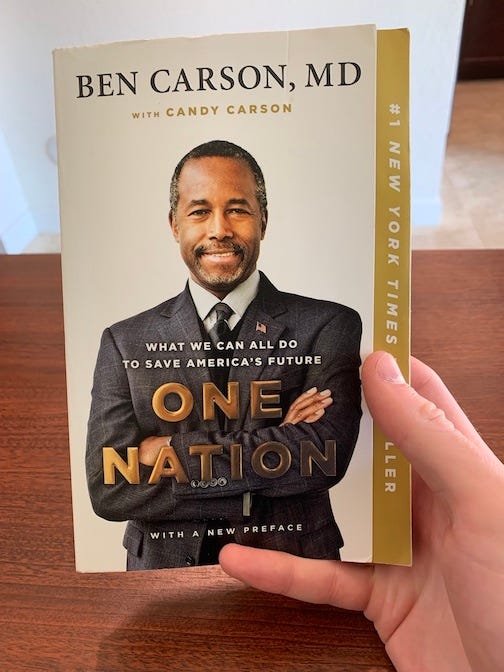One Nation by Ben Carson

Ben Carson was the commencement speaker at Palm Beach Atlantic University a few years ago so my Dad got me this book to read. I thought that I might learn a few things, especially as many of the things that I’ve seen in politics recently have been divisive. A book about unification and understanding others was a book that I greatly enjoyed. I love being able to understand people as best I can and Ben Carson did a great job sharing his experiences with a variety of people.
In the beginning of the book, the author shared something that his Mom used to tell him when he tried to give an excuse for something. He shared the belief that I hold close to heart — we have control over almost everything in our lives.
Pg. xviii, And I had a mother who would never allow herself to be a victim no matter what happened… never made excuses, and she never accepted an excuse from us. If we ever came up with an excuse, she always said, “Do you have a brain?” And if the answer was yes, then she said, “Then you could have thought your way out of it.”
There are many things that we can do in this world but God created each of us for a unique purpose, what is yours? Or maybe a better question is the following:
Pg. xxi, What we need to start thinking about is, how do we solve problems?
I don’t remember exactly what this part of the book was in regards to but I do know that I agreed with it. I know that talking about important issues and understanding the viewpoints and beliefs of others — even if they’re opposing — is the best way to create unity.
Pg. 13, What they fail to realize is that this is a false unity that prevents us from talking about important issues.
I highlighted this and folded this page way down. Often I see people saying things and not comprehending the effect that their words and actions have on others. By becoming more and more self-aware we can hopefully become more and more aware of others. But, beyond that, we want to be able to share truths, if we talk, we should share important things only. I love the things that the author says when he realizes that he hurts the party conversing with him.
Pg. 21, When the offended party proclaims the injury you have wrought upon them with your words, say something to the effect of: “I can see that you were deeply hurt by my choice of words. It was not my intention to hurt you and for that I am sorry. Now I would like for you to know what I intended to communicate to you and I will use different words that will hopefully convey the spirit of my thoughts and allow our discussion to continue.”
History repeats itself; we hear that ALL the time, people often say that. But, people are people and people will be people. Understanding human behavior is so important and valuable.
Pg. 43, There certainly is nothing wrong with being up to date on the current social issues that affect our lives, but in order to have the proper perspective on current events, we need to know what happened in the past.
Now that I read this again a few months after first reading the book, I think of the book of Proverbs. I recall reading a few days ago something along the lines of becoming strong in small situations so that we are stronger in more difficult situations also. We are people; we are all people. Because of that alone, we should help others in any way we that we can.
Pg. 85, If you fail under pressure your strength is not very great. Rescue those who are unjustly sentenced to death; don’t stand back and let them die.
The platinum rule: treat others the way they want to be treated. I assure you, everyone desires respect and love — they just might not know it yet.
Pg. 106, We are more likely to get such individuals to begin thinking of others if we treat them fairly rather than if we demonize them, just as the poor are more likely to want compromise if we don’t assume they are all lazy and undeserving of help.
Ben Carson shared a very important point here. First, establish expectations from both sides and understand what is important to people. Only after that should we seek to explain our perspective. But explaining must follow and not lead.
Pg. 109, I have found that the best way to proceed with civil discussions about issues on which people disagree is to first concur on what is important to both parties. Next, determine who is harmed by each position and agree not to intentionally harm others. Last, exhibit tolerance without discarding core values.
The author shared a definition and overall view of what he defined as an educated citizen. I agree that these are some of the most important characteristics of someone who is educated as a citizen. What I took away from the following list, is that this allows us to relate to nearly anyone. Being an educated citizen does not mean that we are extremely educated; rather, being an educated citizen means that we are informed.
Pg. 131, What an educated citizen knows, here are a few of the basics:
Basic world and American history
Basic world and American geography
Basic household economics (key principles like balancing a checkbook and knowing that you do not buy a house that costs more than two and a half times your annual income could have spared many Americans a lot of trouble before the housing crisis)
Basic understanding of how credit works and how debt accumulates
Names of state and national representatives
Basic nutrition and disease management
Traffic rules for pedestrians and vehicle operators
Basic math including the calculation of percentages
The ability to read at an eighth-grade level
As Charles Swindoll also shared in a book I recently read, a great leader not only is able to identify what is important but also which of those things should be done first. Wisdom is what this is. God does not allow for everyone to be able to do this or have this skill or ability. But, that is by design I believe.
Pg. 139, But only with wisdom is one able to discern which of the many things they are capable of doing should be pursued and in what order.
After this part, Proverbs 29 continues, “but blessed is the one who heeds wisdom’s instruction.” We can swim as hard as we want to but if we do not know the direction of land, it will all be for nothing. We must have a vision, a direction, a focus.
Pg. 171, Proverbs 29:18 says, “Without a vision the people perish.”
Chances are, most people do not have a personal vision for their lives. I struggle with this sometimes. I feel strongly pulled in a certain direction for my 10-year focus. But, one year from now? I’m really not sure. Regardless, I find it vital to spend time in prayer and develop and determine a personal vision for our lives.
Pg. 180, Do you have a personal vision for the rest of your life? If not, stop and write out your lifetime, one-, five-, and ten-year goals.
I spent some time reflecting on the following. This was something where I was like, wow. God is our Creator. Wow. But, more than that, God created everything. Before God created everything, there was just… nothing. Wow.
Pg. 197, The Bible says, “In the beginning, God created the heavens and the earth.” It then goes on to describe the creation week without in any way indicating what the period of time was that elapsed between the first verse of the Bible and the start of creation week. It could have been billions of years, or it could have been less than one day. That means the earth could be billions of years old, or it could have been created in an already mature state by God six thousand years ago. There are many components to organs like the kidney or the eye that are useless without all the other components and, therefore, according to the theory of evolution, should not be passed on to the next generation.
To close the book, I loved the way that Ben Carson went into some detail on this. I’ve read various things about the disadvantages of pro/con lists — simply, they do not include the potential missed opportunities. There are so many different things that can happen if we do or do not do something. What matters is understanding the alternatives. There is a certain skill that enables people to see alternatives that are not yet revealed and predict the unpredictable. I find this one of the most important things that we can do when striving to make change.
Pg. 205, When considering action, do a best/worst analysis:
What’s the best thing that happens if I do it?
What’s the worst thing that happens if I do it?
What’s the best thing that happens if I don’t do it?
What’s the worst thing that happens if I don’t do it?

I loved the many great takeaways within this book and the perspectives that Ben Carson shared with his readers. I always find it valuable to understand what others believe and value and the author showed us various methods for understanding others. This book taught me many things and challenged me at various points throughout the book. It also increased my admiration for Ben Carson and respect for him as an individual.
I gave this book a 4/5